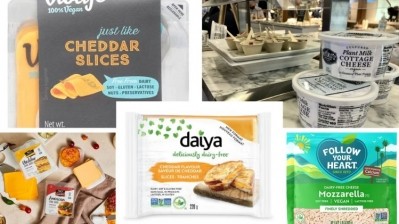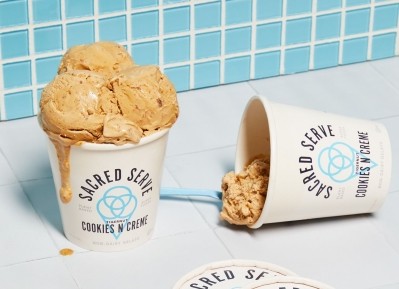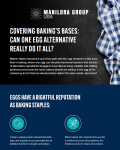‘Eclipse’s ice cream is in a league of its own…’ Sozo Ventures leads $40m series B round at plant-based dairy co Eclipse Foods

Founded by Eat Just R&D exec Thomas Bowman (CTO) and former Bridebox marketer and Good Food Institute advisor Aylon Steinhart (CEO) in December 2018, Oakland-based Eclipse Foods launched in late 2019 promising to disrupt the plant-based ice cream category with products that “actually taste like dairy ice cream.”
Eclipse – which says its technology can apply to multiple dairy categories including milk, cheese, butter, yogurts and desserts - has since picked up business with retailers including Whole Foods, Vons, Albertsons, New Seasons, Central Market, Bristol Farms, Lazy Acres, Gelson’s Market, and GoPuff; and a flurry of foodservice accounts including Afters Ice Cream, the LA Dodger Stadium, Mel’s Original, Silver Diner, and SmashBurger, which recently launched Eclipse plant-based milkshakes nationwide.
And so far, the repeat rates are pretty encouraging, Steinhart told FoodNavigator-USA. “We’re the fastest selling plant-based ice cream in Whole Foods NorCal, and the number two in Pavilions in SoCal.”
Replicating the micellular structures in dairy milk
Eclipse ice cream combines sugar, canola oil, canola protein, food starches (potato, cassava etc), tapioca maltodextrin and tapioca syrup (see box below) and can be manufactured on traditional dairy ice cream lines, “so we don't need to introduce any wildly different complex custom manufacturing processes or equipment, which from a business perspective is extremely important because it means we can scale way faster and way more affordably,” claimed Steinhart.
A patent filed by Steinhart and Bowman in October 2020 lays out how they are attempting to promote micelle formation between plant proteins, starches, and oil droplets in a non-dairy liquid base that replicates the micellular structures in dairy milk whereby casein proteins fold up into spherical structures so they can remain suspended indefinitely in water along with minerals such as calcium.
“Our whole IP platform is about replicating micelles using plants, not using expensive biotech,” said Steinhart. “We figured out how to basically create those in our base, which allows us to create the taste, texture and functionality of dairy.”
Ingredients, Eclipse vintage vanilla: Water, cane sugar, low euric acid rapeseed oil, Eclipse dessert blend (modified food starches, rapeseed protein, tapioca maltodextrin), tapioca syrup, vanilla bean paste (sugar, water, pure vanilla extract, vanilla beans), vanilla extract, salt, calcium lactate, calcium gluconate.
Nutrition (129g serving): 320 calories, 20g fat, 1g sat fat, 24g sugar, and 3g protein.
As a point of comparison, vanilla Häagen-Dazs is made from cream, skim milk, cane sugar, egg yolks, and vanilla extract, and contains 320 calories, 21g fat, 13g sat fat, 25g sugar, and 6g protein.
While the ingredients list for Eclipse is somewhat longer, it contains significantly less saturated fat than dairy ice cream (1g vs 13g in Häagen-Dazs, but is "incredibly creamy," claims Steinhart.
Image credit: Eclipse Foods
‘Plant-based dairy is still very much in its infancy’
“When we look at the space, plant-based dairy is still very much in its infancy, even though it might not look like it,” said Steinhart, noting that while sales of plant-based ice cream topped $458m in measured US retail channels in 2021 (+3% YoY), that only represents a tiny fraction of the overall market.
“So how do we grow that share? It has to be with products that can compete on taste and price with animal-based products.

“At Eclipse our technology is extremely capital efficient. We can run in dairy lines, and we use a blend of inexpensive crops such as cassava, potato and corn, so we have a solution that at scale will be able to compete with a commodity subsidized product.”
‘Our technology is extremely capital efficient’
He added: “There are a lot of almond, oat and coconut based products out there [in the plant-based ice cream set]. And I think that some of those are going to be replaced by products that more closely replicate dairy like Eclipse, which is easy to understand for consumers. It’s plant-based and free from all the top allergens.”
Animal-free dairy (plant-based and non-animal-dairy based) is not going to take over the market overnight, but as products continue to improve, household penetration will continue to grow, he predicted.
“I think of this like electric cars. 10 years ago, electric cars were still seen as fringe. Now it feels like an inevitability that in the not too distant future, there will be more electric cars on the road than gas powered cars.”
* The B round was led by Sozo Ventures with participation from additional investors including Forerunner Ventures, Initialized Capital, Gaingels, and KBW Ventures.
Plant-based dairy: US retail sales in measured channels, 2021
- Plant-based milk: +4% to $2.6bn
- Plant-based creamers: +33% to $516m
- Plant-based ice cream: +3% to $458m
- Plant-based yogurt: +9% to $377m
- Plant-based cheese: +7% to $291m
- Plant-based eggs: +42% to $39m
Source: SPINS Natural Enhanced and Conventional Multi Outlet Channels, powered by IRI























